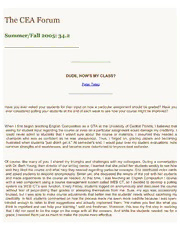
ERIC EJ1097175: Dude, How's My Class? PDF
Preview ERIC EJ1097175: Dude, How's My Class?
The CEA Forum Summer/Fall 2005: 34.2 ___________________________________________ _______________________ DUDE, HOW'S MY CLASS? Peter Telep _______________________ Have you ever asked your students for their input on how a particular assignment should be graded? Have you ever considered polling your students at the end of each week to see how your course might be improved? When I first began teaching English Composition as a GTA at the University of Central Florida, I believed that asking for student input regarding the course or even on a particular assignment would damage my credibility. I could never admit to students that I wasn't sure about the course or materials. I assumed they needed a champion who was as confident as he was unequivocal. Thus, I forged on, grading papers and becoming frustrated when students “just didn't get it.” At semester's end, I would pour over my student evaluations, note common strengths and weaknesses, and become more determined to improve next semester. Of course, like many of you, I shared my triumphs and challenges with my colleagues. During a conversation with Dr. Beth Young, then director of our writing center, I learned that she polled her students weekly to see how well they liked the course and what help they needed regarding particular concepts. She distributed index cards and asked students to respond anonymously. Better yet, she discussed the results of the poll with her students and made adjustments to the course as needed. At that time, I was teaching an English Composition I course with a web component using a course management system called WEB CT, so I decided to develop a polling system via WEB CT's quiz function. Every Friday, students logged on anonymously and discussed the course without fear of jeopardizing their grades or alienating themselves from me. Sure, my ego was occasionally bruised, but I was able to make course adjustments that better met the students' needs without sacrificing my credibility. In fact, students commented on how the process made me seem more credible because I was open- minded enough to listen to their suggestions and actually implement them: “He makes you feel like what you think is important and can help your learning,” said one freshman. Moreover, this was my first step in realizing that I did not need to be the sage on the stage with all the answers. And while the students needed me for a grade, I needed them just as much to make the course more effective. A few semesters later, in my Fiction Writing Workshop class, I continued the process of ongoing student assessment. I created a rough draft rubric for critiquing stories, distributed it to the class, and asked students to make suggestions for improvement before using it in our workshop. One student wrote: “I think instead of saying ‘satisfactory' and ‘weak' when we rate various parts of the story, we can say ‘needs some revision' and ‘needs a lot of revision' to emphasize the writing process on our rubric.” This was a great comment that the entire class embraced. After I received all of their suggestions, I revised the rubric, posted it online, and had students comment again to see if we had reached the final draft. Not only was I seeking their advice to improve the course materials, but with their help I modeled the importance of drafting and revision--key skills in any writing course. Admittedly, it does take some courage to ask students what they think of your course and course materials, and you will undoubtedly receive some comments that are not as useful as others. However, engaging in this process allows you to address challenges early on and avoid shocking surprises come course evaluation time. Additionally, the process empowers students by making them active participants in how they will be taught and graded. They begin to own the course, trust in you and the materials, and consider the process fair. But most of all, getting students involved in how you teach the course demonstrates your care and concern. When you do that, many respond in kind, and the work inevitably improves. _______________________ Peter Telep is a member of the Writer's Guild of America, West, is a produced television writer, and is the author of over thirty novels ranging from television and film adaptations to science fiction, medical drama, and military action/adventure (writing under his own and several pen names). He earned his B.A. and M.A. from the University of Central Florida and has been a GTA, visiting instructor, and is currently a Permanent Instructor of English at the University of Central Florida. He can be reached at [email protected]. Return to Table of Contents
